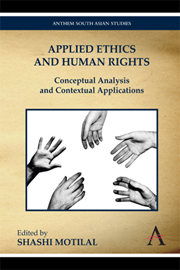Book contents
- Frontmatter
- Contents
- Preface
- Introduction
- Part One Rights, Obligations and Responsibilities
- Part Two Human Rights Issues
- 10 Fragile Identities and Constructed Rights
- 11 Affirmative Action: Compensation or Discrimination?
- 12 Ethics, Human Rights and the LGBT Discourse in India
- 13 Distributive Justice: Locating in Context
- 14 Punishment and Human Rights
- 15 Rights of the ‘Mad’ in Mental Health Sciences
- 16 Choice, Life and the (m)Other: Towards Ethics in/of Abortion
- 17 The Nationalist Project and the Women's Question: A Reading of The Home and the World and Nationalism
- 18 On the Idea of Obligation to Future Generations
- 19 Morality in Cyberspace: Intellectual Property and the Right to Information
- 20 Violence – A Right to the Survival of the Self?
- 21 ‘Moral Obligation’ to Fight for the Prevention of Greater Calamity: A Debate between Sādharana Dharma and Sva Dharma
- 22 Globalisation and Human Rights
- Notes on Contributors
19 - Morality in Cyberspace: Intellectual Property and the Right to Information
from Part Two - Human Rights Issues
Published online by Cambridge University Press: 05 March 2012
- Frontmatter
- Contents
- Preface
- Introduction
- Part One Rights, Obligations and Responsibilities
- Part Two Human Rights Issues
- 10 Fragile Identities and Constructed Rights
- 11 Affirmative Action: Compensation or Discrimination?
- 12 Ethics, Human Rights and the LGBT Discourse in India
- 13 Distributive Justice: Locating in Context
- 14 Punishment and Human Rights
- 15 Rights of the ‘Mad’ in Mental Health Sciences
- 16 Choice, Life and the (m)Other: Towards Ethics in/of Abortion
- 17 The Nationalist Project and the Women's Question: A Reading of The Home and the World and Nationalism
- 18 On the Idea of Obligation to Future Generations
- 19 Morality in Cyberspace: Intellectual Property and the Right to Information
- 20 Violence – A Right to the Survival of the Self?
- 21 ‘Moral Obligation’ to Fight for the Prevention of Greater Calamity: A Debate between Sādharana Dharma and Sva Dharma
- 22 Globalisation and Human Rights
- Notes on Contributors
Summary
The emergence of the Internet as a popular means of creation and dispersal of intellectual goods has caused ripples of dissent among experts in intellectual property rights. The quarrel is between those who think that the Internet upholds the right to information and those who see it as a representative of the right to profit from intellectual goods. Those who value the Internet for its potential to encourage a free flow of information across geographical and political boundaries recognise the right to information as a basic human right. Those who value the Internet only for its commercial potential violate that right and impede the free flow of information across the Net. Information is power. The right to information must, therefore, be recognised as a basic human right and must be respected in order to make sure that individuals across the world stand at an equal footing. With this in view, we give moral support to those who uphold the free flow of information across the Internet and voice our protest against those who have only profit-making in mind, heedless of the needs and rights of many.
Information technology has progressed in leaps and bounds in the past few decades. Not only have IT-related advances been fast, the public has been quick to adopt them in real life. But just as in other technological spheres, the growing use of computers, predominantly the Internet, has given rise to a fresh set of moral issues.
- Type
- Chapter
- Information
- Applied Ethics and Human RightsConceptual Analysis and Contextual Applications, pp. 253 - 264Publisher: Anthem PressPrint publication year: 2010



